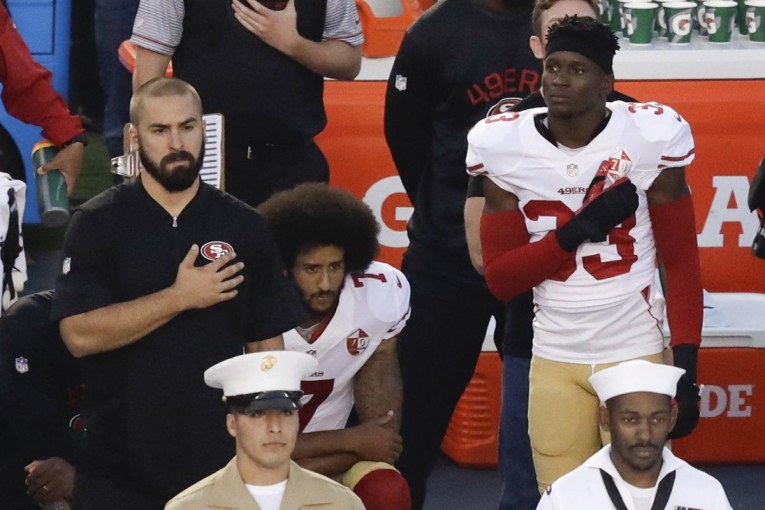

By Jacob Derin
Colin Kaepernick’s recent essay, “The Demand For Abolition,” calling for the elimination of policing and prisons, reflects a dangerous crisis of confidence in American democracy. Beyond the weaknesses and fallacies present in the piece, of which there are multiple, the real danger it represents is a loss of faith in our social and political order.
The resurgence of political radicalism in the United States — both the right and left-wing varieties — is something that should trouble any engaged citizen.
Democracies are predicated on the presence of good-faith debates over the structure of the State and its relationship to the people. A healthy democracy can sustain a wide variety of opinions and disagreements, but it ultimately can only exist when it enjoys the support of the will of the people.
However, Kaepernick’s essay, the first in a series called “Abolition For The People,” presents the  American political system as fundamentally untenable, without offering a viable alternative.
American political system as fundamentally untenable, without offering a viable alternative.
In fairness to Kaepernick, “The Demand For Abolition” reiterates some positions I expressed in a previous article for the Davis Vanguard. At one point, he discusses, “the economies of exploitation, deprivation and captivity that propel forward incarceration and the construction of prisons.” Much of the experience of our criminal justice system, from arrest to conviction, does depend, to a heartbreaking degree, on one’s socioeconomic status.
Our incarceration rate is the highest in the world despite evidence that incarceration is not helping to reduce the overall crime rate. Something must change, but, were we to adopt Kaepernick’s “f— reform” position, the path forward becomes difficult or impossible to determine.
Kaepernick tells his readers that: “To be clear, the abolition of these institutions is not the absence of accountability but rather the establishment of transformative and restorative processes that are not rooted in punitive practices.” But, he fails to specify what type of accountability a post-prison criminal justice system would employ.
Instead, he advocates “creat[ing] space for budgets to be reinvested directly into communities to address mental health needs, homelessness and houselessness, access to education, and job creation as well as community-based methods of accountability.” Again, the phrase, “community-based methods of accountability,” is a vague non-answer to the question of how such a society would operate.
The call for funding to be redirected to mental health services, education, etc. has become a common rallying cry intoned alongside the “defund the police” movement. I see an investment of resources in these areas as an unmitigated good, but their positive effects can only be felt if we have a functioning criminal justice system that can protect Americans from violence and other harm. Without this fundamental security, civilized society, which is predicated on mutual trust and cooperation, is impossible.
The police power of the State is the most effective instrument human civilization has developed to ensure that such security is possible.
So, when Kaepernick asks, “What is being reformed or reformulated?” I would answer that it is one of the bedrock institutions of civilized society and that any proposal for its abolition must be clearly and meticulously defined.
But, it is the larger picture and political context behind Kaepernick’s argument that I find most troubling. He writes that “The central intent of policing is to surveil, terrorize, capture and kill marginalized populations, specifically Black folks,” without providing much evidence to support that extraordinary claim beyond an appeal to the 1701 Act for the Better Ordering of Slaves, which specified the legal means available for capturing runaway slaves.
There can be no doubt that there were periods in American history where the suppression of dissent from African-American slaves was a major, and even primary concern of state and local governments. The fear of a slave revolt was ever-present in areas with large Black minorities, or even majorities.
But Kaepernick’s appeal to the state of the criminal justice system in the 1700s, in and of itself, says almost nothing about the present. This is not 18th century America. Even with the inequalities and injustices present in the modern United States, it would be difficult to argue that the central and primary concern of our police force and criminal justice system is the systematic terrorization of Black people. Yet, this position is becoming increasingly well-subscribed in the wake of George Floyd’s death.
To accept that thesis is to accept Kaepernick’s conclusion that we should abolish, in its entirety, the policing and prison systems of this country. Ironically, enacting such a proposal would inevitably hurt the populations Kaepernick is concerned with the most. Crime is most common in the poorest communities, and the reality of modern America is that these areas are disproportionately inhabited by racial minorities. Without a coherent and effective plan to replace policing, we risk leaving the people living there without protection.
2020 has been a year that has devastated the national economy and healthcare system, but perhaps even more importantly it has called the moral foundations of this country into question. Such questions are fundamental to democracy and even necessary, but for them to be constructive we must not attempt to destroy its central institutions without carefully considering the consequences.
To Kaepernick and those convinced by his arguments, I would say: “Give reform a chance.”
Support our work – to become a sustaining at $5 – $10- $25 per month hit the link:

“Landing party to Captain Kirk. We have found that a level-headed alien virus has taken root in the population of Planet Vanguard. If allowed to spread, the progressive nature of this planet could be forever altered. The Prime Directive mandates that we do not intervene.”